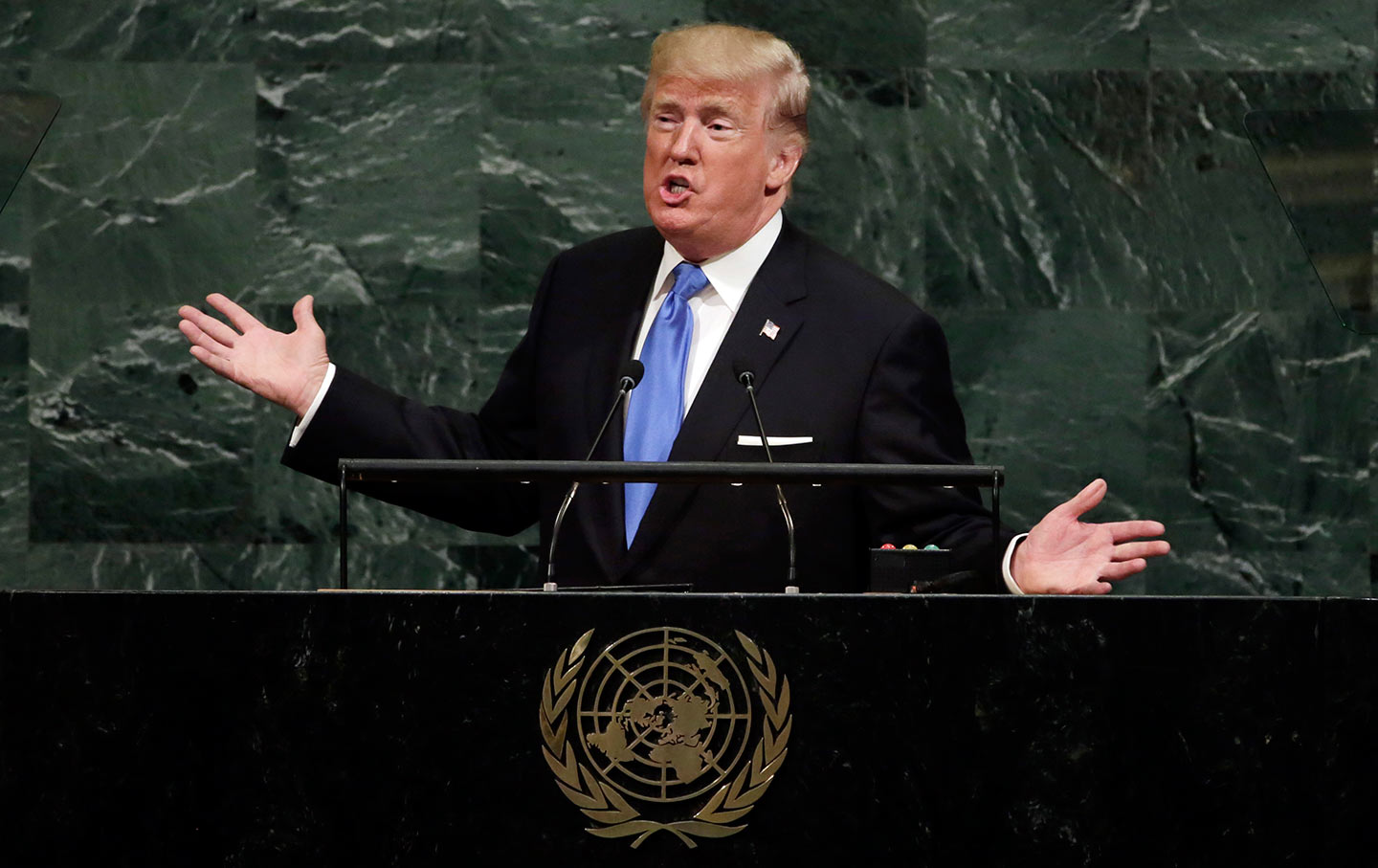[vc_row][vc_column][vc_raw_html]JTNDYmxvY2txdW90ZSUyMGNsYXNzJTNEJTIydHdpdHRlci10d2VldCUyMiUyMGRhdGEtbGFuZyUzRCUyMmVuJTIyJTNFJTNDcCUyMGxhbmclM0QlMjJlbiUyMiUyMGRpciUzRCUyMmx0ciUyMiUzRUp1c3QlMjBoZWFyZCUyMEZvcmVpZ24lMjBNaW5pc3RlciUyMG9mJTIwTm9ydGglMjBLb3JlYSUyMHNwZWFrJTIwYXQlMjBVLk4uJTIwSWYlMjBoZSUyMGVjaG9lcyUyMHRob3VnaHRzJTIwb2YlMjBMaXR0bGUlMjBSb2NrZXQlMjBNYW4lMkMlMjB0aGV5JTIwd29uJTI2JTIzMzklM0J0JTIwYmUlMjBhcm91bmQlMjBtdWNoJTIwbG9uZ2VyJTIxJTNDJTJGcCUzRSUyNm1kYXNoJTNCJTIwRG9uYWxkJTIwSi4lMjBUcnVtcCUyMCUyOCU0MHJlYWxEb25hbGRUcnVtcCUyOSUyMCUzQ2ElMjBocmVmJTNEJTIyaHR0cHMlM0ElMkYlMkZ0d2l0dGVyLmNvbSUyRnJlYWxEb25hbGRUcnVtcCUyRnN0YXR1cyUyRjkxMTc4OTMxNDE2OTgyMzIzMiUyMiUzRVNlcHRlbWJlciUyMDI0JTJDJTIwMjAxNyUzQyUyRmElM0UlM0MlMkZibG9ja3F1b3RlJTNFJTBBJTNDc2NyaXB0JTIwYXN5bmMlMjBzcmMlM0QlMjIlMkYlMkZwbGF0Zm9ybS50d2l0dGVyLmNvbSUyRndpZGdldHMuanMlMjIlMjBjaGFyc2V0JTNEJTIydXRmLTglMjIlM0UlM0MlMkZzY3JpcHQlM0U=[/vc_raw_html][vc_column_text]The stage for this year’s UN General Assembly was still being set up as late as two and a half minutes to midnight on the Doomsday Clock! And against a backdrop of a major earthquake – of a political nature – in the Anglo-Saxon lands of the Northern hemisphere, the hefty exchanges of nuclear-tinged vitriol, and global migration crises, the precariousness of the global system, upheld by the UN since its post-war conception, hangs delicately in the balance.
But instead of a pair of caring hands of an experienced diplomat to confront the problems of today, international delegates got a Trump rally.
The week-long UN General Assembly is an annual plenum where every internationally recognised sovereign state – key word for this year being sovereign – reiterates its commitment and appraisal to UN-brokered agreements, shared values and goals and the importance of international cooperation in the maintenance of peace and prevention of conflict.
Some nations recount their history and raison d’être in global affairs. And from these, often self-indulgent, speeches we can analyse the use of national leaders’ rhetoric as they seek to justify their aims and means as national and international actors. That is something we received from President Trump this week.
I’ll start with patriotism. Because it appears as though what Trump’s America is faced with right this moment is the risk of occupation from foreign fascist forces. This was illustrated as Donald juxtaposed the war time resistance efforts of Britain and France with the need for a unilateralist approach. It’s immediately apparent that Trump sees his country as a stand-alone target, and hence plays on patriotic fervour to defend his shifting foreign policy.”Regarding international conflict, the blonde mop did indeed say “We cannot wait for someone else; for far away countries or far off bureaucracies. We can’t do it. We must serve our problems…”.
What’s to be gleamed from that? Trump personally seems to have both abandoned and denounced institutional opportunism and international organisations and regimes. This will serve to, whether intentionally or inadvertently, cow his Western allies into a rethink of their reliance on henceforth outdated military pacts with the United States. Following US Secretary of Defence Jim Mattis’ statement that they have not attempted to shoot down either of the two ballistic missiles recently fired over Japan, as they did not pose a threat to the United States, Japan’s premier, Shinzo Abe, has since found a premise to rush to rewrite Japan’s pacifist constitution, while South Korea began to flirt with possession of its own nuclear arsenal. Hardly in-line with the cheerful notion of peace, cooperation, and altruistic world governance, is it?
But it also underlined Trump’s underlying commitment to his own electoral promises: the restoration and normalisation of patriotism in the United States. Such a rhetorical question employed at the UN in this light sounds like “Are we still patriots enough to protect our sovereignty?”
When you see Trump finally peel himself away from the podium, trot a couple of steps, extend his waiving hand towards a fictitious crowd of fans, (repeat two more times), and shuffle towards the stage exit, you come to realise the importance of this address to his American Trumpistas. His speech was brimming with predictable rhetorical devices and vivid, quotable language that his Twitter followers are already familiar with. Indeed, the use of ‘Rocket Man’ and ‘loser terrorists’ had already proliferated in the Twittersphere before this speech – easy to hashtag and subtly drop into any 140-character-long logic on the nuances of the North Korean problem and domestic terrorism.
And what’s more, such language facilitates an oversimplification of the endless intricacies that international coalitions at the UN aim to overcome. While Trump acknowledges that “Authority and authoritarian powers seek to collapse the values, the systems and alliances that prevented conflict and tilted the world toward freedom since World War Two,” what he doesn’t realise is: first, the irony; but second, his failure to interact within the international community to uphold these values enshrined in the UN.
Contrary to what a Wall Street Journal commentator claimed, Trump is not an adherent of realpolitik. Trump entered an environment in which he personally rejects the constructivist values, and expects to be adorned and respected. The Donald wasn’t at the Security Council on Tuesday. His rejection of institutional structures and processes as instruments, through which one achieves strategic (national) interests, places him outside of the typically observed model of the rational-realist actor of today.
Fiery statements of his such as “Major portions of the world are in conflict, and some, in fact, are going to hell,” and his threat to “totally destroy” North Korea, further allude to the USA’s reassuring might in a world where the good must counter acts of evil.
However, this doesn’t simplify the real negotiations and processes being carried out by international actors and mediators in the Western Pacific, or on the UN Security Council. Real consensus is being built between veto-wielders over North Korean containment, facilitated by the USA’s own Nikki Haley, is a terrific sign of how the establishment upholds continuity and commitment to the UN, while a head of state is completely averse to it.
So this is the inherently contradictory nature of Trump’s America. The alienation effect felt by US allies is forcing them to face their new realities, adapt their realpolitik and continue multilateral processes, while Trump’s America becomes increasingly isolated under its self-obsessed exceptionalism and withdrawal from The Paris Climate Accord and potentially the Iran Nuclear Deal. The tragic irony of it all: his boast to the Assembly “As the president of the United States, I will always put America first.”
George Baines, French & German
(Image courtesy of The Nation)[/vc_column_text][/vc_column][/vc_row]

